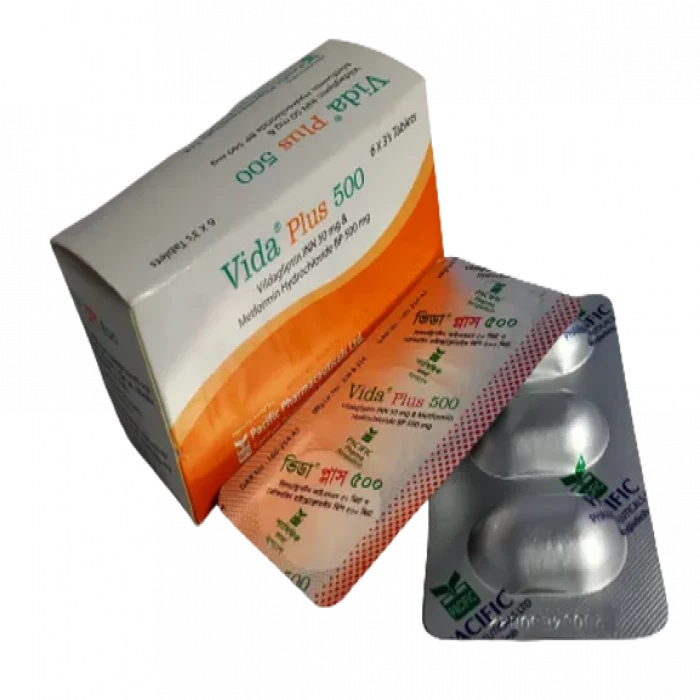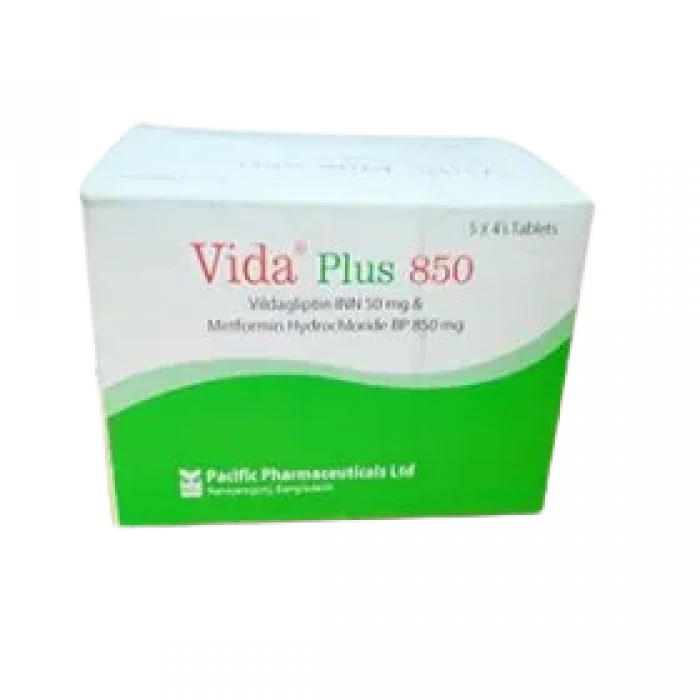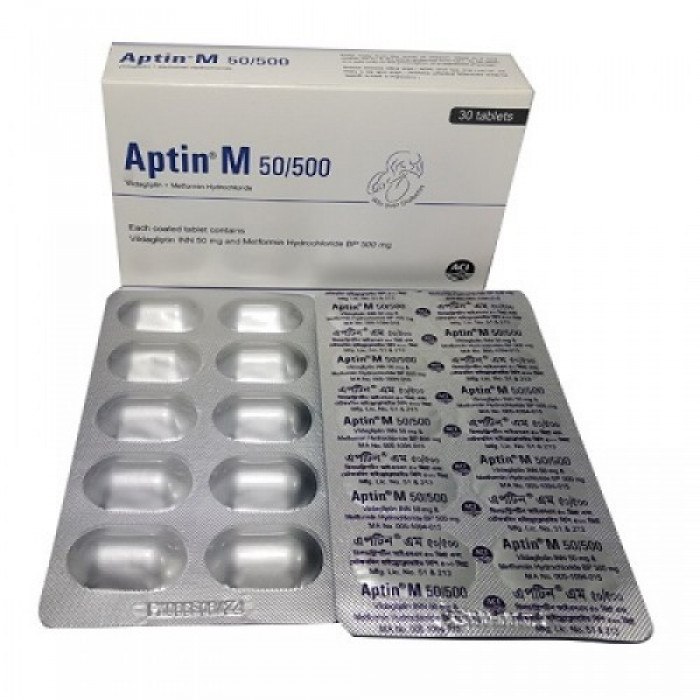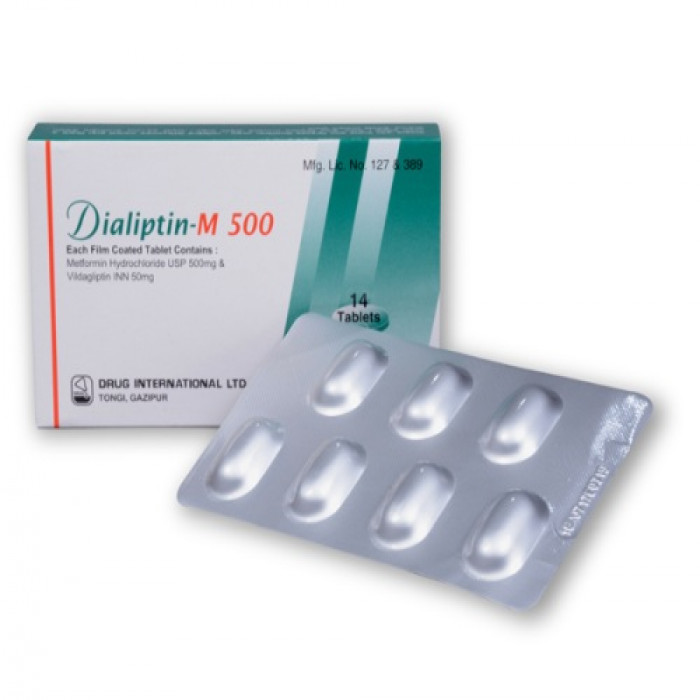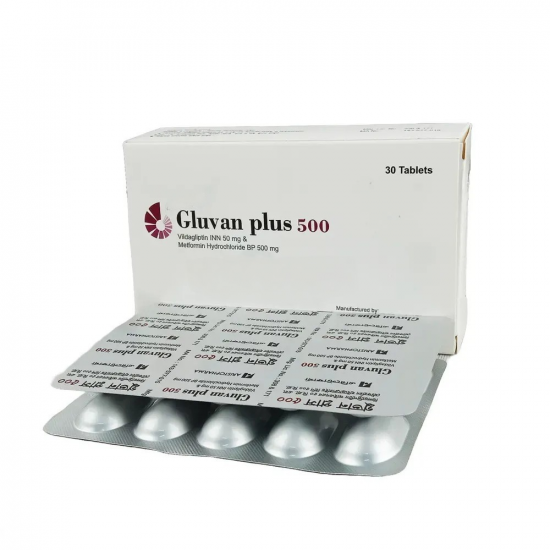
✔ 100% Authentic Product
👁️ Currently Viewing 1835
Gluvan Plus | 50+500mg Tablet | 1 Strip
Vildagliptin + Metformin Hydrochloride is prescribed alongside diet and exercise to improve blood sugar control in adults with type 2 diabetes mellitus who are not adequately managed on Metformin Hydrochloride or Vildagliptin alone, or who are already receiving both drugs separately.
Discount
Price: ৳ 226
MRP:
৳
240
6%
Off

100% Genuine Products, Guaranteed

Safe & Secure Payments, Always

Fast, Secure & Efficient Delivery

Proper Packaging
 Cash on Delivery - All over Bangladesh
Cash on Delivery - All over Bangladesh Regular Delivery - 12-24 Hours, Dhaka City* Charge Tk.39-59
Regular Delivery - 12-24 Hours, Dhaka City* Charge Tk.39-59 Regular Delivery - 24-48 Hours, Other Cities* Charge Tk.99-110
Regular Delivery - 24-48 Hours, Other Cities* Charge Tk.99-110
 ফ্রি ডেলিভারিঃ - ৯৯৯ টাকা+ অর্ডারে, ঢাকা
শহরে
ফ্রি ডেলিভারিঃ - ৯৯৯ টাকা+ অর্ডারে, ঢাকা
শহরে ফ্রি ডেলিভারিঃ - ২৯৯৯ টাকা+ অর্ডারে, ঢাকার
বাহিরে
ফ্রি ডেলিভারিঃ - ২৯৯৯ টাকা+ অর্ডারে, ঢাকার
বাহিরে
100% Genuine Products, Guaranteed
Safe & Secure Payments, Always
Fast, Secure & Efficient Delivery
Proper Packaging
 Cash on Delivery - All over Bangladesh
Cash on Delivery - All over Bangladesh Regular Delivery - 12-24 Hours, Dhaka City* Charge Tk.39-59
Regular Delivery - 12-24 Hours, Dhaka City* Charge Tk.39-59 Regular Delivery - 24-48 Hours, Other Cities* Charge Tk.99-110
Regular Delivery - 24-48 Hours, Other Cities* Charge Tk.99-110 ফ্রি ডেলিভারিঃ - ৯৯৯ টাকা+ অর্ডারে, ঢাকা
শহরে
ফ্রি ডেলিভারিঃ - ৯৯৯ টাকা+ অর্ডারে, ঢাকা
শহরে ফ্রি ডেলিভারিঃ - ২৯৯৯ টাকা+ অর্ডারে, ঢাকার
বাহিরে
ফ্রি ডেলিভারিঃ - ২৯৯৯ টাকা+ অর্ডারে, ঢাকার
বাহিরে
✅ Description:
Vildagliptin works by inhibiting the enzyme DPP-4 (Dipeptidyl peptidase-4), which breaks down incretin hormones like GLP-1 and GIP. This inhibition boosts levels of these hormones, leading to increased insulin release from pancreatic beta cells and reduced glucagon release from alpha cells, particularly during high blood sugar, thereby lowering glucose production in the liver and reducing blood sugar levels.
Metformin Hydrochloride, a biguanide oral antidiabetic, lowers both fasting and post-meal glucose without causing hypoglycemia. It works by reducing glucose production in the liver, decreasing glucose absorption in the intestines, and enhancing insulin sensitivity to improve glucose uptake and use in tissues.
✔️ Side Effects
Common effects include headache, dizziness, tremor, nausea, and low blood sugar.
✔️ Dosage & Administration:
Adults: Dose depends on the patient’s current Metformin regimen. Typically taken twice daily—one tablet in the morning and one in the evening—with food to reduce gastrointestinal side effects. Patients switching from separate tablets may start with equivalent doses in the combination form. Daily vildagliptin dose should not exceed 100 mg. No clinical data support triple therapy with other antidiabetics.
Children: Not recommended under 18 years.
Elderly: Monitor kidney function regularly; use only if renal function is normal.
Renal impairment: Avoid if serum creatinine >1.5 mg/dL (men) or >1.4 mg/dL (women).
Hepatic impairment: Not recommended if baseline liver enzymes are >3× upper normal limit.
✔️ Drug Interactions
No significant interaction between vildagliptin and metformin has been found. Vildagliptin is not metabolized by, nor does it affect, CYP450 enzymes, so it is unlikely to interfere with drugs processed by this pathway. It shows no major interactions with common medications like glibenclamide, pioglitazone, amlodipine, digoxin, ramipril, simvastatin, valsartan, or warfarin. However, drugs like furosemide, nifedipine, and glyburide can raise metformin levels in the blood without affecting its kidney clearance.
✔️ Contraindications:
Not to be used in patients allergic to either component, with kidney disease or dysfunction, acute myocardial infarction, septicemia, heart failure, or metabolic acidosis (including diabetic ketoacidosis). Avoid in those undergoing imaging with iodinated contrast, as it may cause sudden kidney issues.
✔️ Pregnancy & Lactation
Use only if potential benefits outweigh risks, as safety in pregnancy is unproven. It is unknown if the drugs pass into breast milk; therefore, avoid during breastfeeding.
✔️ Precautions & Warnings
Risk of lactic acidosis from metformin accumulation—stop treatment immediately if suspected and hospitalize the patient. Monitor kidney function annually (more often in elderly or borderline cases). Liver function tests should be checked before starting, every 3 months in the first year, and periodically thereafter. Discontinue if persistent liver enzyme elevation or signs of liver damage occur. Stop treatment 48 hours before surgery with general anesthesia and restart only after at least 48 hours.
✔️ Storage
Store in a cool, dry place, away from heat and light. Keep out of children’s reach.
⚠️Disclaimer:
At ePharma, we’re committed to providing accurate and accessible health information. However, all content is intended for informational purposes only and should not replace medical advice from a qualified physician. Please consult your healthcare provider for personalized guidance. We aim to support, not substitute, the doctor-patient relationship.




